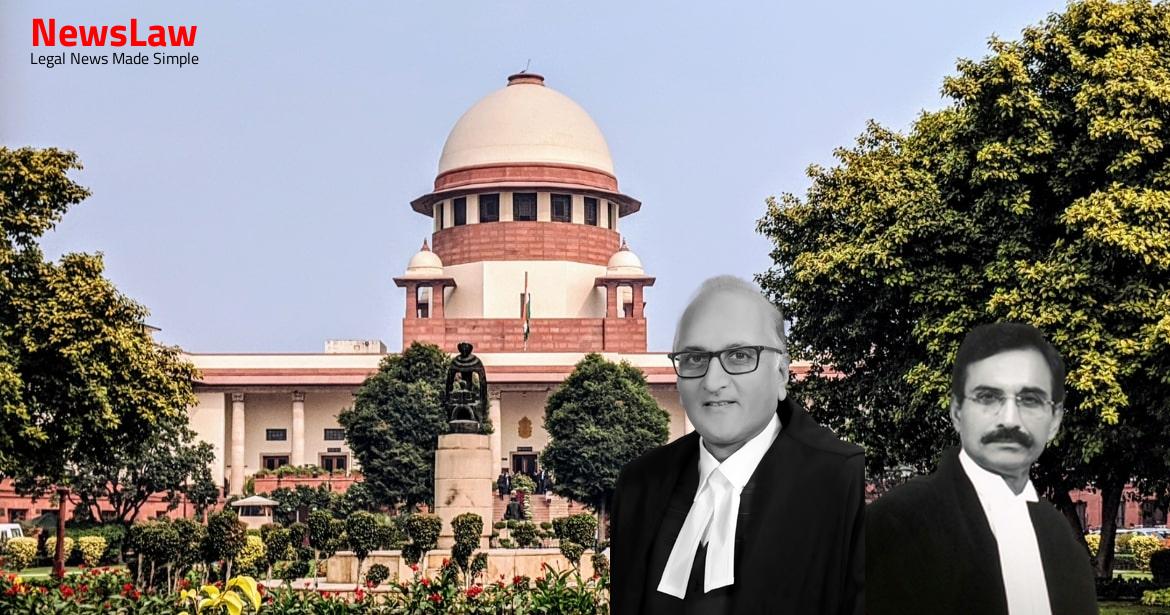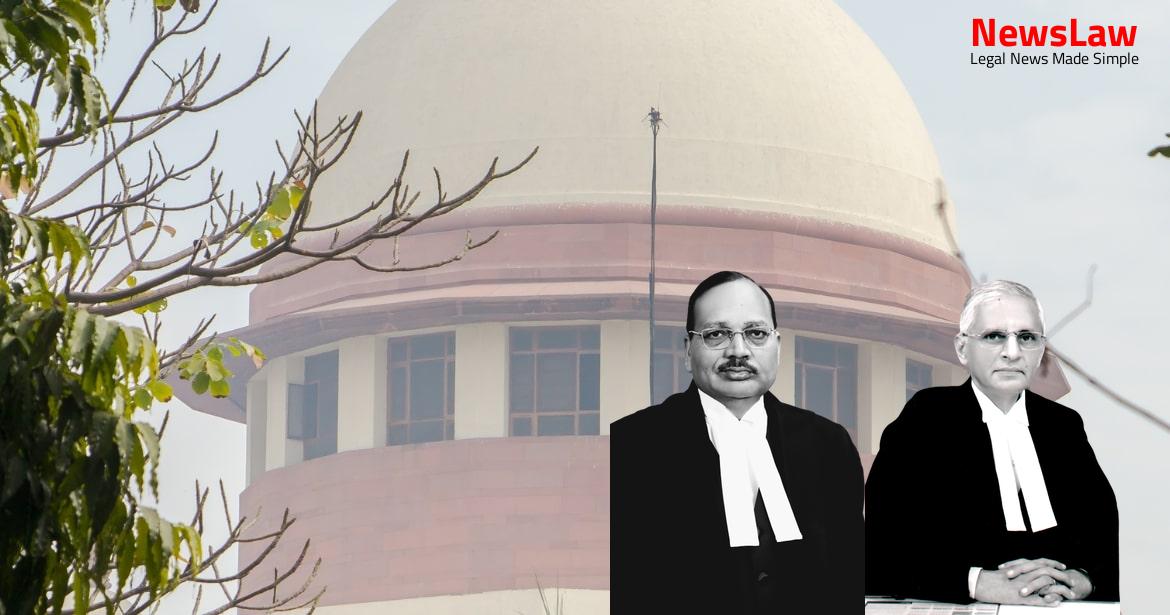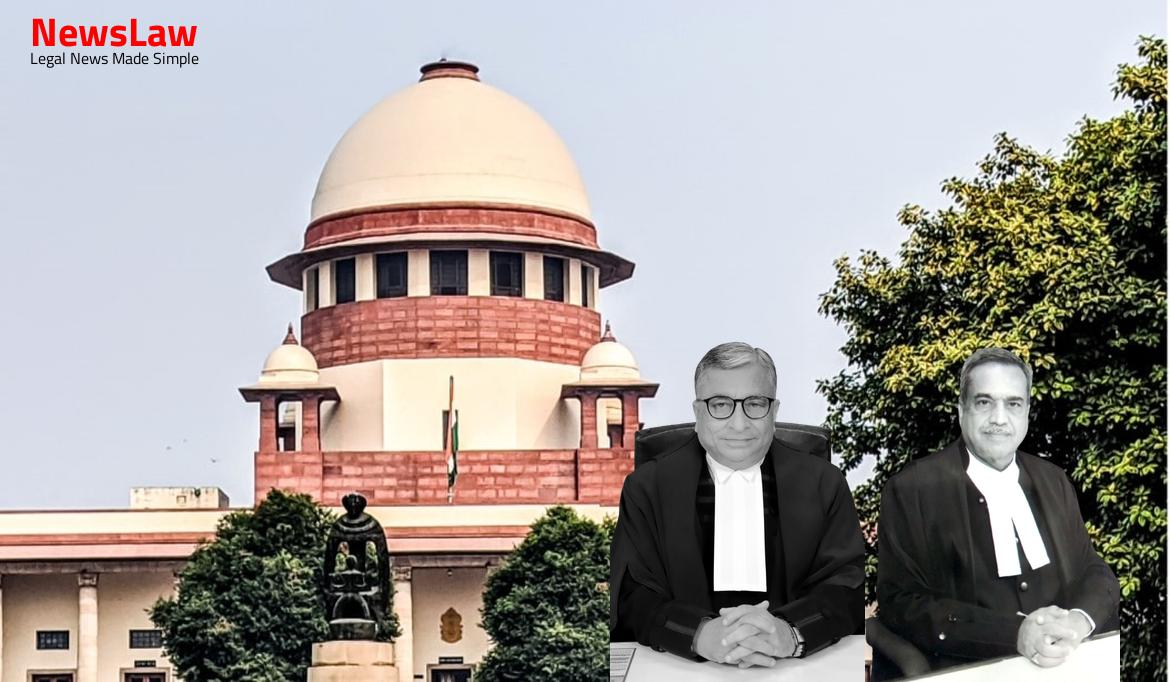This case summary focuses on the court’s in-depth legal analysis regarding the issue of excessive delegation in insolvency legislation. The intricate examination of the powers conferred and limitations placed on the Central Government’s authority in imposing conditions on the enforcement of the Insolvency and Bankruptcy Code is at the forefront of this discussion. The analysis sheds light on the complexities of conditional legislation and its implications on the phased interpretation of laws. Stay tuned for a comprehensive review of the court’s insights on delegated legislative powers.
Facts
- The resolution plans in some cases have not yet been approved by the adjudicating authority.
- Some approvals granted are subject to attack before the appellate tribunal.
- Notification dated 15.11.2019 issued by the Central Government is referred to as the impugned notification.
- Reliefs have been claimed regarding the validity of the Insolvency and Bankruptcy Rules of 2019 and regulations challenged by the Insolvency and Bankruptcy Board of India on 20.11.2019.
- The challenge is stated to be confined to the impugned notification during the submissions.
- Recovery and insolvency proceedings were initiated in several cases.
- Writ petitioners before the High Courts, now respondents in transferred cases before the Court, claim to be aggrieved by the impugned notification.
- The petitioners had furnished personal guarantees to banks and financial institutions, leading to release of advances to companies they were associated with.
- Personal guarantees were invoked in many cases, with pending proceedings against associated companies.
- Insolvency proceedings are at different stages and resolution plans are being finalized.
Also Read: Legal Analysis of Claim for Loss of Profit in Delayed Contract
Arguments
- Petitioners argue that impugned notification is an exercise of excessive delegation.
- They contend that Central Government has no authority to impose conditions on the enforcement of the Code.
- Petitioners highlight that Section 2 of the Code is not a definition clause but acts as a lever for phased interpretation.
- They argue that selective application of the Code to personal guarantors is unconstitutional and goes against the legislative intent.
- According to petitioners, the liability of a guarantor is co-extensive with the principal debtor unless specified otherwise by the contract.
- Petitioners stress on the importance of reviving corporate debtors as per the objectives of the Code.
- The impugned notification is viewed as a naked classification exercised through conditional legislative powers.
- Petitioners assert that the selective enforcement of provisions on personal guarantors creates legal anomalies.
- They question the application of Section 1(3) and argue that it does not permit such selective enforcement.
- Petitioners emphasize that Part III applies to individuals and partnership firms, not just personal guarantors to corporate debtors.
- Mr. Rai argued that a notification similar to the impugned one was issued on 01-05-2018 for financial service providers.
- Mr. Ritin Rai, representing some respondents, highlighted the interconnectedness between corporate debtors and personal guarantors, which was acknowledged by the 2018 amendment.
- He emphasized that the power under Section 1(3) of the Code was properly exercised.
- It was argued that the discretion given to the executive to implement legislation in phases is a common practice that acknowledges the complexity of enforcing new laws.
- The Code’s provisions and the impugned notification were seen as crucial economic measures to align insolvency laws with international standards.
- Sections 227 to 229 of the Code were brought into force to achieve this alignment.
Also Read: Public Declaration Requirement in Marriage under Hindu Marriage Act
Analysis
- Definition of terms such as corporate person, corporate debtor, creditor, debt, person, corporate applicant, corporate guarantor, and personal guarantor are provided.
- The minimum default amount required for insolvency and liquidation matters is specified as one crore rupees.
- The Adjudicating Authority, National Company Law Tribunal is defined for the purpose of this Part.
- Section 13 declares a moratorium and initiates the corporate insolvency resolution process.
- Section 1(3) specifies conditional legislation where the executive brings the law into operation at its discretion.
- The Code applies to various entities including companies, LLPs, personal guarantors, partnership firms, and individuals.
- Section 14 imposes a moratorium on various actions by the corporate debtor upon insolvency commencement.
- The Code establishes an institutional framework including IBBI, insolvency professionals, information utilities, NCLT, and NCLAT.
- Part of the legislation is found intra vires, while other portions are held ultra vires by the Indian Parliament.
- Provisions regarding surety’s liability, variations in contract terms, discharge of surety, and extending laws to Part ‘C’ States are discussed.
- The power of conditional legislation allows the delegate to determine when a legislative rule of conduct becomes effective.
- The distinction between conditional legislation and delegated legislation lies in the former determining when a rule of conduct becomes effective versus the latter involving the delegation of rule-making power to an administrative agent.
- The power to extend, modify, or repeal enactments beyond the intended application time or area by the legislature is deemed to be legislative in nature and cannot be delegated.
- Legislative intent cannot solely be gathered by a mechanical interpretation of words but requires an understanding of the entire statute and its purpose.
- The power to repeal or amend laws is a legislative power that cannot be exercised by an authority other than the legislature itself.
- Essential legislative functions cannot be delegated, as seen in cases where the power of extension, modification, and repeal of laws amount to excessive delegation of legislative power.
- Phased implementation of laws or policies may be necessary for gradual acceptance and lesser resistance.
- The judicial key to construction involves a composite perception of the provision’s content and its purpose.
- The power to modify an enactment, without limits on the degree of modification, is deemed to be a legislative power.
- Instances of excessive delegation are seen in cases where Parliament did not provide guidance for including particular instances in an enactment, leaving such decisions to the discretion of the executive.
- The power of conditional legislation is distinct from delegated legislation, with the former determining when a legislative rule becomes effective.
- The exercise of extending an enactment beyond its designated application time or area is seen as exceeding the powers conferred and is therefore deemed ultra vires.
- Policy implementations should align with legislative intent and guidelines, ensuring there is no excess delegation of legislative powers.
- The power to extend laws unenacted by a competent legislature and the power to repeal or modify laws extend beyond permissible delegation.
- The concept of phased implementation of laws allows for better acceptance and understanding by stakeholders.
- Reliance was placed on Delhi Laws Act, 1912, In re v. Part ‘C’ States (Laws) Act, 1950 (supra) and Lachmi Narain v. Union of India.
- Provisions of diverse nature have been characterized as conditional legislation by the court.
Also Read: OCI Cardholders’ Rights and Retroactive Notifications
Case Title: LALIT KUMAR JAIN Vs. UNION OF INDIA (2021 INSC 297)
Case Number: T.C.(C) No.-000245 / 2020



